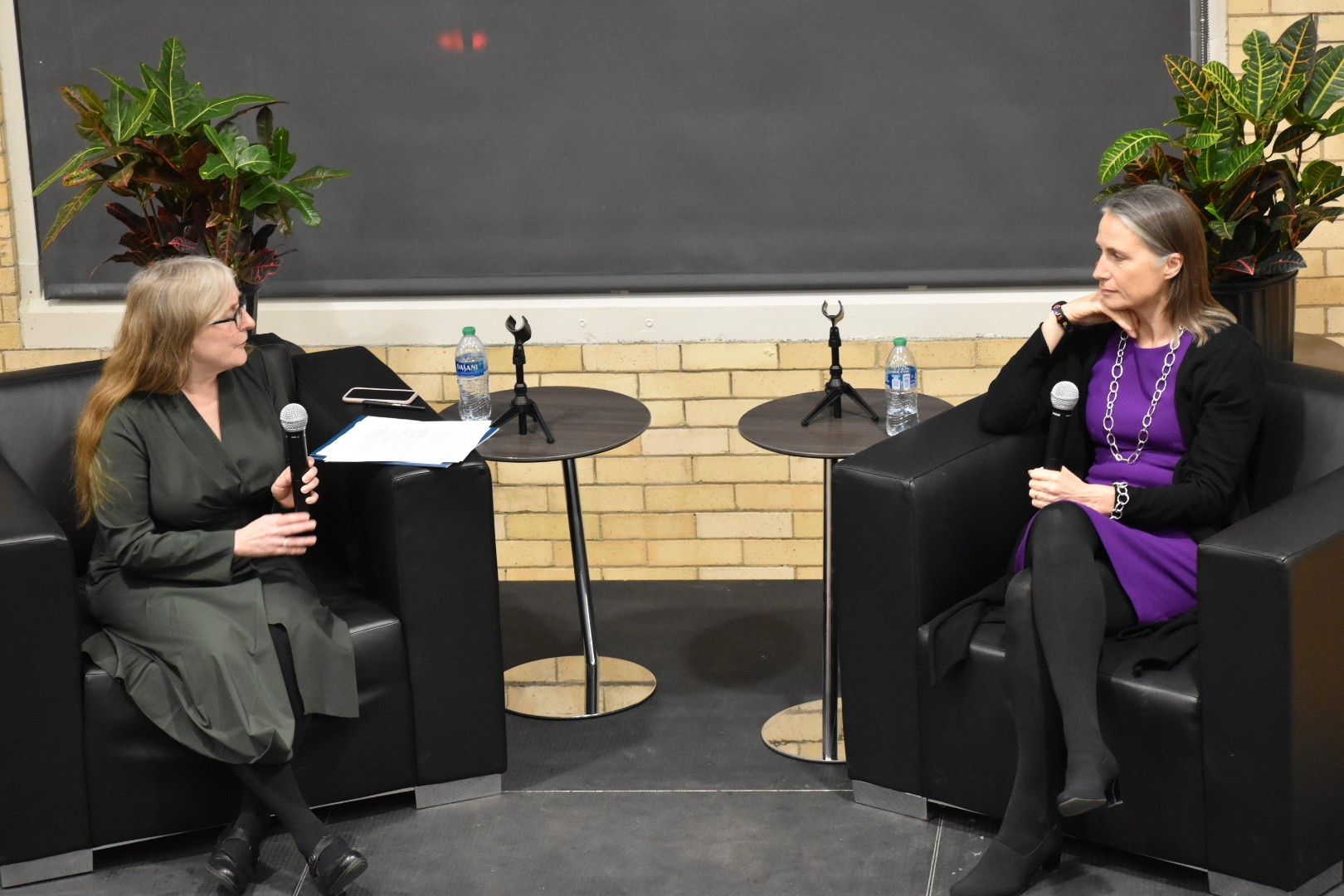Fiona Hill speaks about dangers of autocratic rule
Foreign policy, intelligence expert on Russia visits Ohio State for lecture

|
Franny Lazarus Ohio State News |
Last week, Fiona Hill, former Senior Director for Europe and Russia at the National Security Council, spoke to a riveted audience at The Ohio State University.
Hill visited campus as the 2022 Joseph J. Kruzel Lecture speaker for the Mershon Center for International Security Studies. The series honors Joseph Kruzel, a Mershon associate who taught political science at Ohio State during an interval between Air Force, Defense Department, and diplomatic postings. In 1995, Kruzel died in an accident in Sarajevo, Bosnia, while heading the US team in the negotiations to end the Yugoslav wars.
Executive Vice President and Provost Melissa L. Gilliam introduced Hill, officially naming her a Buckeye and sharing that the university was honored to host her. Kruzel represented the importance and power of education, Gilliam said, and Hill reflects that in her career.
Earlier in the day, Hill spoke to a Mershon-only audience about how scholarships and study-abroad opportunities enabled her to become one of the few children of her English mining community to attend university, and ultimately to get a PhD in history from Harvard and become a leading authority on Russian politics.
“We’re excited to hear from you,” Gilliam said. “You represent the best of what we try to do here at Ohio State, which is to change the lives of individuals. When we educate individuals, we change the life of a family, we change society.”
Hill is the Robert Bosch Senior Fellow at the Center on the United States and Europe in the Foreign Policy program at the Brookings Institution, a Washington, D.C.-based nonprofit that conducts research on local-, national- and global-level issues. From 2017 to 2019, she served under President Donald Trump as deputy assistant to the president and senior director for European and Russian Affairs on the National Security Council. She memorably testified at the former president’s impeachment hearing in 2019. Prior to that, she served as national intelligence officer for Russia and Eurasia at the National Intelligence Council from 2006-2009.
Hill was delighted to earn her honorary Buckeye title, saying that she had wanted to visit the university for a long time.
“I’ve been in the United States since 1989,” Hill said, “so this has been a long time getting here. And I hope that, now that I’m a Buckeye, I’ll come back again.”
Hill spent 90 minutes answering questions from the event’s moderator, Dorothy Noyes, director of the Mershon Center, and from the audience. The conversation focused on what is happening in Russia during the conflict in Ukraine: What is Russian President Vladimir Putin thinking? What do the Russian people think? How is this impacting the Russian economy?
Hill spoke of Putin’s adaptability, something that has allowed him to remain the central figure in his country’s political arena since the 1990s. However, she said, Putin has failed to account for what she called the “knock-on effects” of the war: the ripples that sanctions, military drafts and protests are having inside Russia.
“I don’t think Putin himself, or the people in the Kremlin, have a full picture of what’s happening,” she said.
Again and again, Hill returned to the danger of having one person so inextricably tied to a country’s decision making.
“What do you get out of too much fealty to one guy?” Hill asked the audience. “You get a horrific war, the largest military conflict in Europe since World War II. You get essentially a world war. All because one guy made a decision based on his own misconceptions.”
The United States can learn from this, what Hill called “the fetishization of the presidential executive power.”
“The preamble to the Constitution isn’t ‘I, the president.’ It’s ‘We, the people,’” Hill said. Instead of looking for a single leader who can solve the problems of a nation, we need to look to ourselves.
“How, in the United States, do you create a country that works for everyone? It won’t be one person, in the presidency,” Hill said. “We look too much to the presidency to be the be-all, the end-all, the champion. That’s how you get autocratic, authoritarian systems.”


